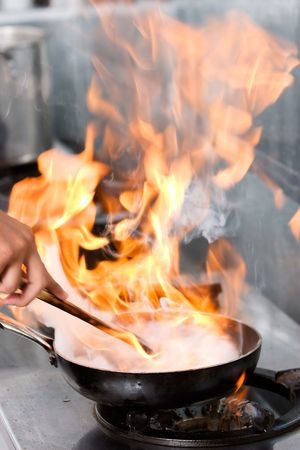

Kitchen Safety Tips to Avoid Kitchen Accidents!
Kitchen fires kill about 480 Americans in kitchen accidents every year. These fires also injure almost 5,000 people and cause $724 million in property damage. The reality is that we all need to eat and most of us use our kitchens to prepare meals and snacks multiple times per day. Fires are only one part of the danger; over 100,000 people rush to an emergency room from a scalding accident, by far the most common kitchen related injury. Other accidents involve sickness from bacteria living on kitchen surfaces including counter tops, the sink and cutting boards. Shockingly, the average cutting board has 200% more fecal bacteria than a toilet seat. It takes only ten bacteria to make a person sick and the average kitchen sponge or cloth carries 134,630 bacteria! Your kitchen faucet alone houses more than 13,227 bacteria. Often, children are victims of kitchen related accidents as they do not understand the dangers of sharp knives or boiling water and reach up to grab something interesting off the counter. The bottom line is that the kitchen is one of the most dangerous places in your house.
Kitchen Hazards Include
- Leaving the stove on
- Defective appliances
- Wet or otherwise slippery floors
- Hot oil
- Electrical outlets
- Sharp knives/graters
- Fires/smoke inhalation
- Bacteria
- Toxic fumes/chemicals
There are kitchen accidents that are truly the fault of the victim due to carelessness but there are situations where a third party caused the accident and should be held liable. An electrical shock, smoke or chemical fume inhalation, a serious cut or burn can all be deemed damage worthy personal injury, depending on the circumstance. Whether you were on the job or simply cooking for your family, a personal injury attorney can wade through the particulars of your case and help you get the compensation you deserve.
Kitchen Safety Tips
Knives:
- Store knives in a knife block
- Never leave a knife unattended near the edge of a counter
- Don’t cut with dull knives
- Always watch where you are cutting
- Always cut away from you
- Don’t rush
- Keep a first aid kit close by
Storage:
- Keep sharp and breakable items safely away from children
- Close cabinets and drawers after you retrieve your item
- Don’t overstuff cabinets
- Install child safety locks on cabinets
- Keep plastic bags out of reach of children
Cooking:
- Keep children out of the kitchen when using the stove or oven
- Turn frying pan handles toward the inside of the stove
- Use a burner that is the same size or smaller than the pot or pan
- Clean oven regularly to avoid fires
- Keep a fire extinguisher handy
- Monitor oil closely and don’t use too much
- Avoid wearing loose fitting clothing and pull back long hair
- Replace appliances with frazzled cords
- Don’t yank cords out of the socket
Food Poisoning:
- Wash utensils, cookware and containers with warm, soapy water
- Don’t keep leftovers for too long
- Don’t keep freezer food for too long
- Don’t leave food on the counter, cooked or raw
- Clean up spills right away
- Clean your sink with soap regularly
- Wash your kitchen cloths regularly and let them dry out in between uses
- Don’t cross contaminate raw meat utensils and cutting boards with those used for vegetables
Whether you were injured in a kitchen accident as an employee or at home you could be eligible for damages due to employer negligence or a defective product. Contact an accident attorney at Tario & Associates, P.S.. We will assess your situation and fight for the compensation you deserve!
Read More